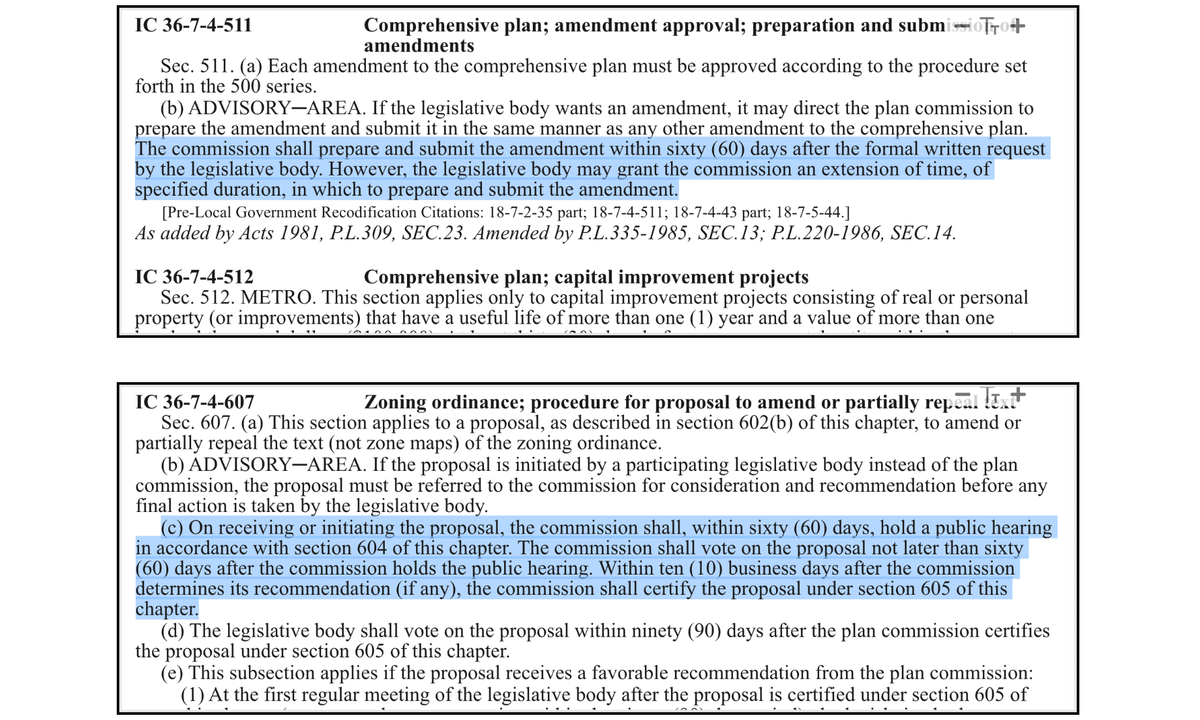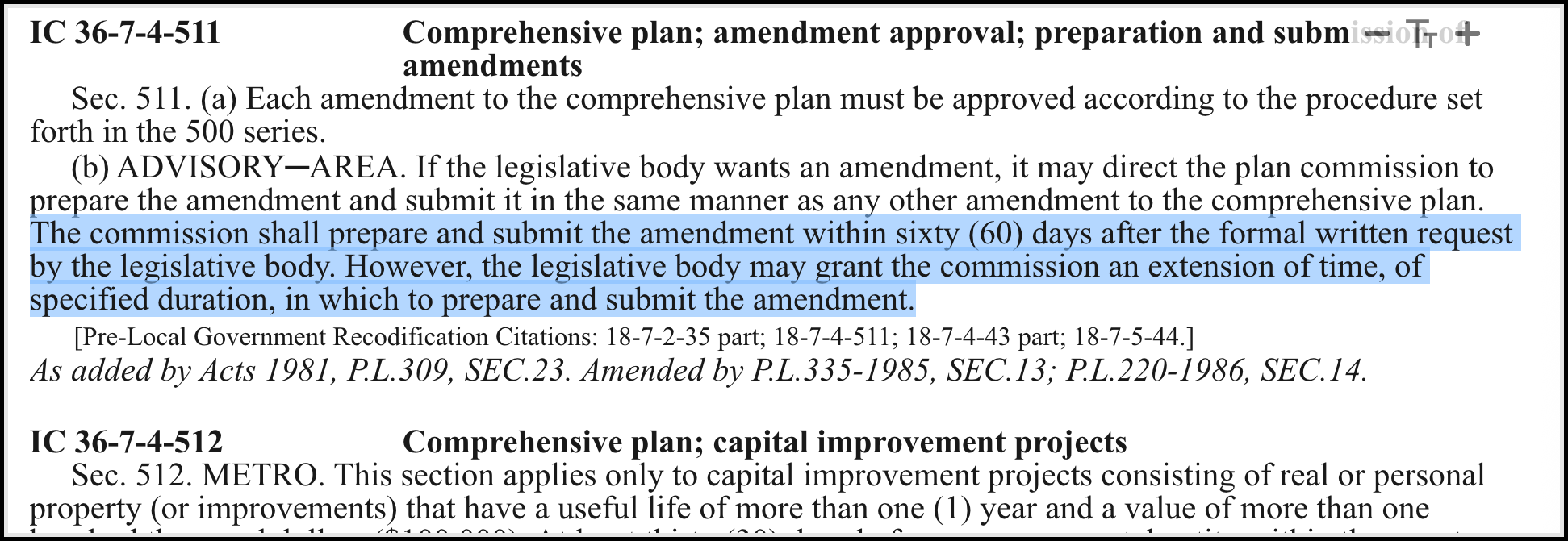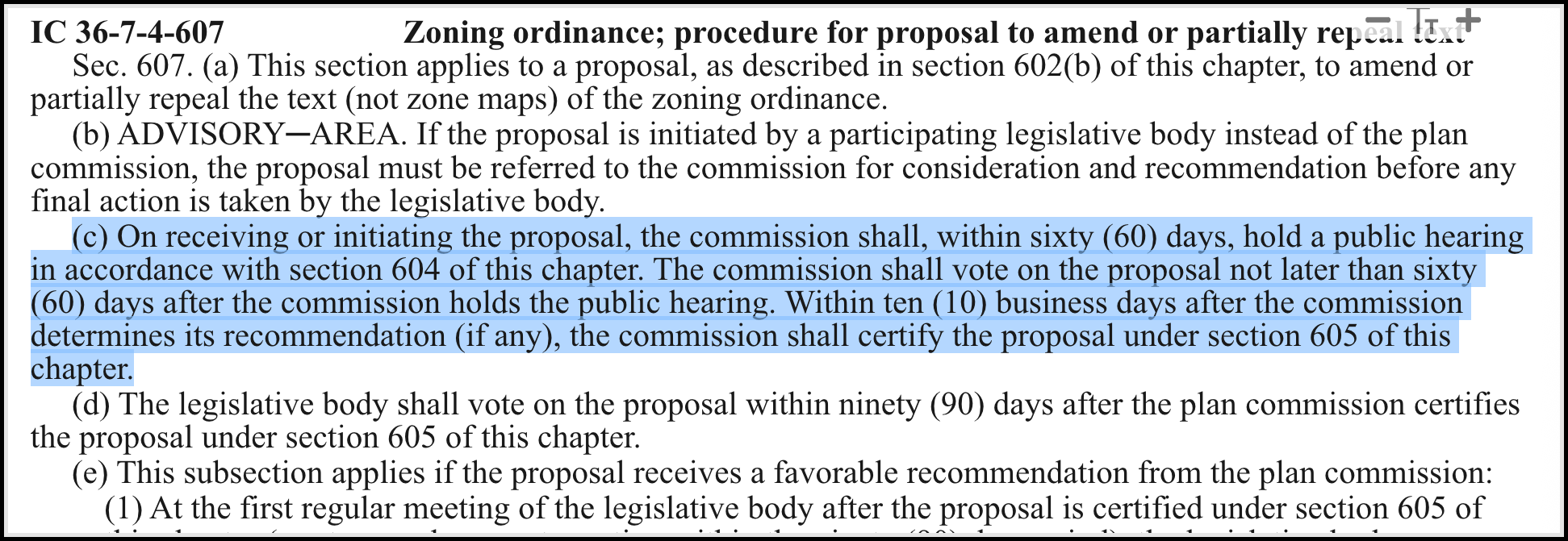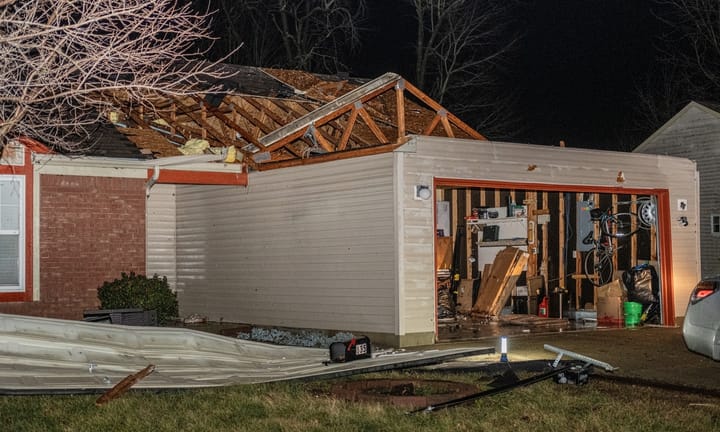Bloomington misses statutory deadlines for action on zoning code changes, after initiation by city council
One of the proposed zoning changes to be heard on July 14—about single-resident occupancy (SRO) housing—was initiated by city council action last November. By mid-July, the statutory deadline for a plan commission vote will have been blown by about three months.



Left: The part of state code with timelines related to city council-initiated changes to the comprehensive plan. Right: The part of state code with timelines related to city council-initiated textual changes to the zoning code.
Bloomington's plan commission is set to convene a meeting on July 14, to conduct hearings on seven different changes to the UDO (Unified Development Ordinance).
One of the proposed changes to be heard on July 14—about single-resident occupancy (SRO) housing—was initiated by city council action last November. The council's action on Nov. 26, 2024 [Res 2024-25] came with a plan commission deadline that is set forth in state law. The plan commission is required under state law to hold a public hearing within 60 days of the council's initiation and to vote within 60 days of the public hearing. By mid-July, the statutory deadline for a plan commission vote will have been blown by about three months.
However, even on July 14, the plan commission is not expected to vote on the SRO proposal. Instead, the plan commission is expected to continue the public hearing, probably delaying a vote another month until its following meeting, on Aug. 11. That's despite the fact that the petitioner, which in this case is the city itself, has asked that the second hearing be waived, a hearing which is normally required under plan commission bylaws.
What's going on?
The planned delay is an apparent effort to arrange events so that somewhere in the historical timeline there is a sequence that conforms with state law. The idea is that on July 14, the plan commission would continue the public hearing until August and delay voting on the recommendation about SRO housing. Then, two days later, the city council—at its first meeting after its customary "summer recess"—will have a chance to re-do its initiation of the SRO proposal.
That is, the city council could re-take the action that it already took on Nov. 26 of last year. That way, the plan commission's continued hearing and vote in August would come within the statutory deadline—if the deadline is keyed to city council action on July 16.
Responding to a B Square question, city council administrator/attorney Lisa Lehner put it like this:
It has been recommended by City Legal that the Plan Commission open its public hearing on July 14, 2025, as planned. Notice was sent to property owners, as required by law. The date, time and location of the continued hearing will be provided at the July 14, 2025 meeting.
I've recommended that the City Council, during its July 16, 2025 meeting, renew its initiation of a proposal (from Resolution 2024-25) and comply with the timeline in Indiana Code -607, thereby restarting the 60-day timeline. This resolution would recognize that the Plan Commission opened the hearing on July 14, 2025 and state that the hearing was continued to a new date. This would allow the Plan Commission to act within the statutory time frame.
The hash that's been made of the statutory deadlines looks like it's due in part to the legal advice that the city council received about the Nov. 26, 2024 resolution. The resolution [Res 2024-25] that was approved by the city council includes this statement of a timeframe: "The Plan Commission is instructed to prepare and submit the amendment within 90 days from the effective date of this resolution, unless granted an additional extension of time, of specified duration, in which to prepare and submit the amendment."
Despite the city council's wording, there is no provision for an extension of time in the part of state law that the council used to initiate the process for changing the zoning law. The council's timeframe of 90 days also doesn't match the 60 days in state code.
Here's how the block of code for Sec. 607 reads, which is the part of state law that the city council was trying to use (emphasis added in bold):
IC 36-7-4-607 Zoning ordinance; procedure for proposal to amend or partially repeal text
Sec. 607.
(a) This section applies to a proposal, as described in section 602(b) of this chapter, to amend or partially repeal the text (not zone maps) of the zoning ordinance.
(b) ADVISORY─AREA. If the proposal is initiated by a participating legislative body instead of the plan commission, the proposal must be referred to the commission for consideration and recommendation before any final action is taken by the legislative body.
(c) On receiving or initiating the proposal, the commission shall, within sixty (60) days, hold a public hearing in accordance with section 604 of this chapter. The commission shall vote on the proposal not later than sixty (60) days after the commission holds the public hearing. Within ten (10) business days after the commission determines its recommendation (if any), the commission shall certify the proposal under section 605 of this chapter.
Where did the idea come from that the city council could set a different deadline, or extend it? That idea was likely cribbed from a different part of state zoning law that involves changes to the city's comprehensive plan, not the zoning code. Here's how that block of state law reads (emphasis added in bold):
IC 36-7-4-511 Comprehensive plan; amendment approval; preparation and submission of amendments
Sec. 511.
(a) Each amendment to the comprehensive plan must be approved according to the procedure set forth in the 500 series
(b) ADVISORY─AREA. If the legislative body wants an amendment, it may direct the plan commission to prepare the amendment and submit it in the same manner as any other amendment to the comprehensive plan. The commission shall prepare and submit the amendment within sixty (60) days after the formal written request by the legislative body. However, the legislative body may grant the commission an extension of time, of specified duration, in which to prepare and submit the amendment.
Acting on the belief that it could also extend the deadline for a text amendment, Bloomington's city council voted on Feb. 19 to extend the deadline another 90 days. But even that new extended deadline, which works out to May 20, has now passed.
The council passed a second resolution on Nov. 26 last year [Res 2024-23] that initiated a zoning change—about affordable housing incentives. But the resolution on affordable housing incentives did not include any wording about a deadline.
On Jan. 16, a public hearing for the plan commission on the topic of the affordable housing incentives item was given published notice in the newspaper, and a chance for public comment was given. But only a partial draft of the proposed zoning amendment was available for that meeting. As the staff memo put it, "Number 2 [the remaining point to be included for a complete draft] requires more coordination and discussion with the Plan Commission to determine what type of incentives to include, as well as what outcomes are desired for those incentives."
So it's not clear that the plan commission's Jan. 16 meeting, with its chance for public comment, would have counted as the statutorily required public hearing under Sec. 607 of the state planning code. In any case, the plan commission did not vote on the proposal at its Jan. 16 meeting and it has been tabled at subsequent meetings. So the plan commission is well past the twin 60-day statutory deadlines for action, based on the Nov. 26, 2024 resolution about affordable housing [Res 2024-23].
Hopi Stosberg is the councilmember who put forward Res 2024-23. She is also the city council's representative on the plan commission. At the June 9 meeting of the plan commission, she asked for an update on the amendment to the affordable housing incentives, saying that it had been continued from one meeting to the next for "too long." Assistant director of planning and transportation, Jackie Scanlan, indicated to Stosberg there was a possibility that it could appear with the set of other amendments that the plan commission would be considering on July 14.
Responding to an emailed B Square question about the council's administrator/attorney, Lisa Lehner wrote about the missed deadline in connection with Res 2024-23, "I'm communicating with other offices to collect current information."




Comments ()